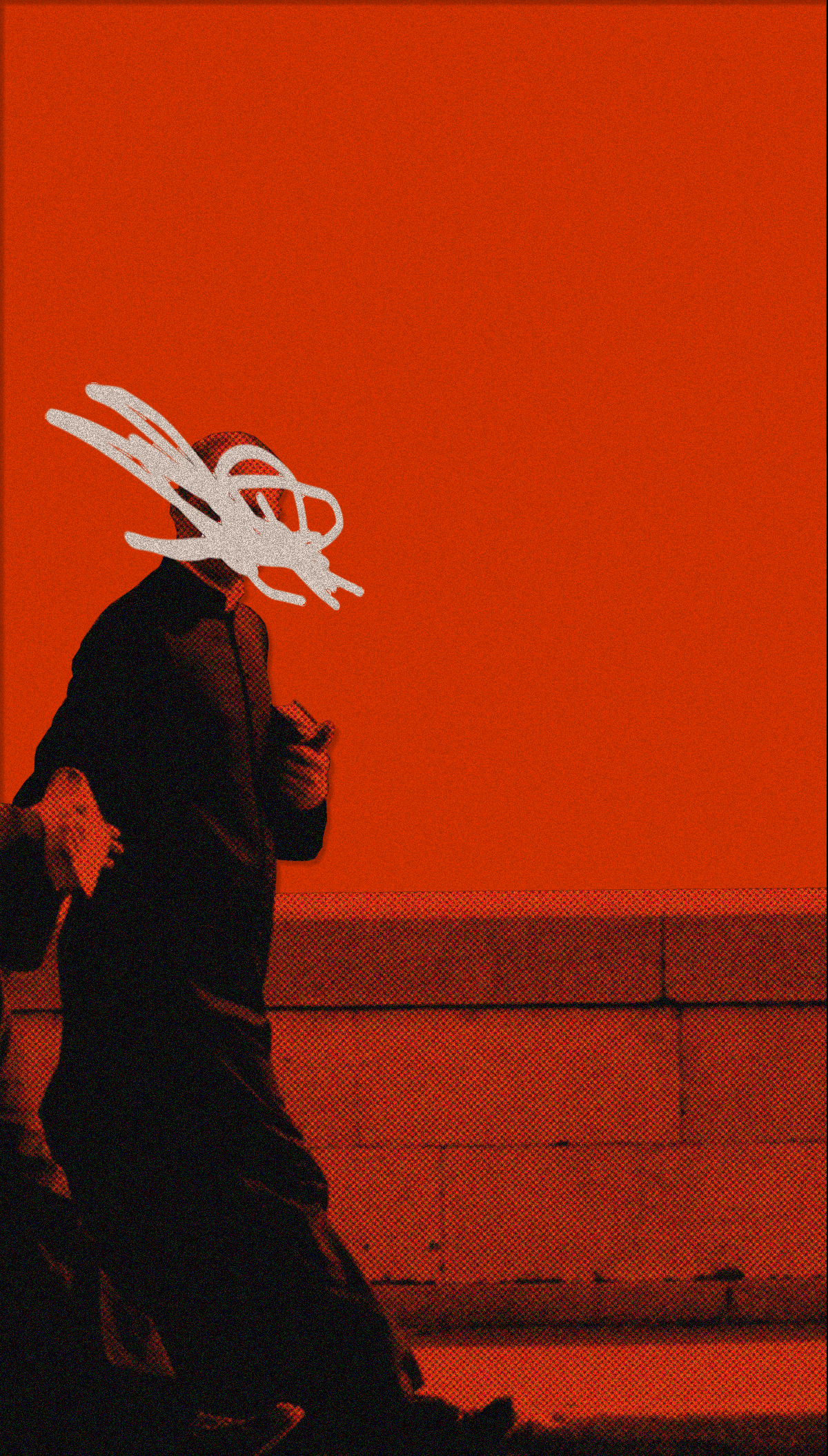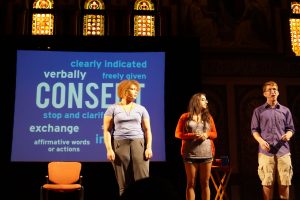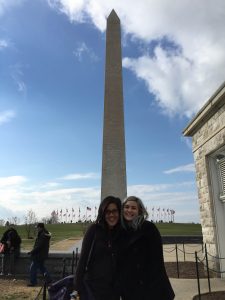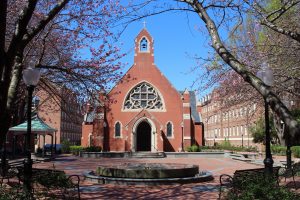Content warning: This article discusses multiple instances of sexual assault, violence, and abuse by the clergy.
When Dennis Heaphy met Fr. Theodore Dziak, S.J., Heaphy was a young student at Boston University, while Dziak was an influential spiritual leader to undergraduates. Dziak was like a role model to Heaphy.
“I poured my heart out to Ted,” Heaphy, a future Georgetown chaplain, later wrote in a 1999 letter to the Provincial of New England Jesuits.
But one night, Dziak came into Heaphy’s room while traveling to a service trip in Central America, sat on his bed, and told Heaphy he loved him. Then, Dziak kissed Heaphy on the forehead.
Heaphy felt sick.
But Heaphy was not alone. Allegations of sexual assualt by Dziak, a on-campus chaplain at Georgetown University from 1984 to 1990, came to public attention in 2021, when he was accused of drugging and raping Tim Ballard, 41, a then-24-year-old DePaul University graduate. The allegations sparked Dziak’s removal from his chaplaincy at Le Moyne College in September 2020, before claims became public.
Though there are no confirmed cases of abuse while Dziak was an on-campus chaplain at Georgetown, the university granted Dziak the space, opportunities, and resources to begin a volunteer organization that gave him access to abuse and manipulate students for decades.
From the early 1980s to the late 2010s, Dziak moved across four college campuses and one secondary school—Georgetown University, Boston College, Loyola University New Orleans, Le Moyne College, and St. George’s College—leaving a trail of abuse behind. The Voice spoke with five survivors of Dziak’s abuse, as well as chaplains, lawyers, and faculty members from different universities.
…
Dziak, now in his early 70s, was ordained in 1983 through the New England Province for the Society of Jesus and launched Jesuit Volunteers International (JVI) within Georgetown office space in November of that year. JVI acted as an independent and free-standing organization that was housed in Alumni Square. Dziak lived on campus at Georgetown from 1984 to 1990 and was the chaplain of an all-male residential hall.
JVI—which is now called Jesuit Volunteer Corps—brought students to Central America for emotionally-intensive, culturally-immersive service trips. In 1990, Dziak moved to Boston College where he continued service trips to Central America and the Caribbean through an organization similar to JVI called Ignacio Volunteers.
From 1998 to 2003, Dziak was president of St. George’s College, an all-male school in Jamaica, after departing from Boston College. It is unclear if there is similar documentation of allegations from Dziak’s time there.
After graduating from DePaul, Ballard was accepted to be the director of religious education from 2004 to 2006 in southern Belize through JVI.
“Within a couple weeks, my working relationship with Ted became very tumultuous. He was very hot and cold,” Ballard said.
In southern Belize, according to Ballard and documented in his diary entries, Dziak drugged, photographed, and raped Ballard on at least four distinct occasions in November and December of 2004 and again in July of 2005 when Dziak returned to Belize. According to Ballard, he reached out to Fr. Bill Oulvey, S.J., the in-country Jesuit Superior with concerns for his safety. Oulvey did not respond to Voice requests for comment. The last sexual assault left Ballard with a long-term injury.
“Before Belize and after Belize are two different books of my life,” Ballard said. He described severe anxiety and depression following his return back to the United States. “To say it nearly took my life is 100 percent true.”
“He is a predator. He is a monster. He is a serial rapist,” Ballard said of Dziak.
Although the alleged rapes took place in 2004 and 2005 after Dziak had left Georgetown’s campus, volunteers and faculty associated with JVI expressed concerns about Dziak’s patterns of abuse as early as the 1980s.
…
Dennis Heaphy was JVI’s first-ever volunteer in the 1980s and eventually the program’s executive director from 2004 to 2006. At the time of their meeting, Heaphy was an undergraduate at Boston University, and Dziak was preaching at the university chapel.
“He accepted me as the first volunteer in the newly formed Jesuit Volunteer Corps. I hadn’t even filled out an application,” Heaphy said.
According to Heaphy, he faced continual emotional abuse by Dziak as he volunteered with JVI in Central America, all facilitated by an environment characterized by isolation.
Jose Tamayo, a volunteer under Dziak in 1997, described a vulnerable, insular dynamic. “He forms this isolated group. He discourages any outside participation,” Tamayo said. “He is creating this very dependent community.”
Previous volunteers who spoke with the Voice commented on Dziak’s independent authority throughout the development and duration of his various programs. “With his position as a priest, as a leader of this organization, you just didn’t question it. You trusted the process.”
Before, during, and after the abroad programs, students participated in group reflections with Dziak to discuss heavy, sensitive topics. “I honestly think that those weekly reflections—that you could not miss and were held late at night—were a way for Ted to kind of groom the landscape of the kids mentally, emotionally, spiritually,” Beth Eilers, a former Boston College graduate student, said.
The Provincial of the New England Province of Jesuits did not respond to Voice inquiries about JVI volunteers’ reported concerns over Dziak’s behavior in the 1980s, when Dziak was still at Georgetown.
…
Dziak’s pattern of behavior was well recorded. The Voice acquired documentation from members of the Boston College chaplaincy informing John Savard, S.J., a chaplain at the university, of complaints about Dziak in 1998, stating it would be “highly irresponsible for his religious superiors to permit him to function pastorally or professionally with young adults or college-aged students.” The Voice also obtained additional documentation of Boston College students, faculty, and staff sending letters and filing reports on Dziak’s abuses in 1998 and 1999.
Boston College President William Leahy did not respond to concerns at the time, according to Eilers. Twenty-two years later, Leahy wrote a letter to the campus community in April 2021, following scrutiny due to Ballard’s allegations as students called for Leahy’s resignation.
“First, after I learned of issues regarding Fr. Dziak and his social activities with students in the Ignacio Volunteer Program in the fall of 1997, I discussed them with him and raised concerns with his Jesuit superiors about the suitability of his working at Boston College,” Leahy wrote in the public statement. “I had no authority or administrative responsibility in regard to Fr. Dziak, and have had no contact with him since he left Boston College.” Leahy continues to serve as president of Boston College as of January 2022.
Eilers sent letters to Robert Levens, S.J., provincial of the New England Province from 1998 to 1999, asking him to protect students from Dziak. Additionally, the Voice acquired a 1998 letter written by Heaphy, directed to Levens. In his letter, Heaphy describes the emotional abuse, grooming, and trauma inflicted by Dziak throughout his time involved with JVI. Heaphy wrote, “Ted is a man in deep pain and a danger to himself and to others. He is of special danger to young people.” Levens now works in the retreat center where Dziak resides.
A Georgetown University spokesperson stated that they have no knowledge of Heaphy’s letter to the provincial.
In 2006, Dziak left Belize and went to serve as the director of the Jesuit Center at Loyola University, which was in the New Orleans Province, but is now the South Central Province. In July 2008, Dziak was made the vice president of mission and identity. Dziak continued to take students abroad, but again faced accusations of abuse documented by students and faculty at Loyola, driving a 2011 HR investigation. In the HR report obtained by the Voice, the investigation surrounded non-consensual advances and verbal inappropriateness perpetrated by Dziak, as well as claims of hazardous driving.
Katrina Weschler, an employee at Loyola alongside Dziak, wrote a letter to the department of human resources that sparked the investigation in 2011. “I do not feel comfortable, nor is it my intention to imply that Fr. Ted has engaged in illegal behavior,” Weschler wrote in an HR complaint. “That said, as an eyewitness I am adamant that there is a blatant abuse of power. Once again, I feel obligated by Loyola University’s code of conduct to report this behavior before it becomes criminal.”
Dziak remained at Loyola until he took another sabbatical in March 2019. In 2020, Dziak joined Le Moyne College as the College Chaplain for Ignatian Ministry. Dziak was indefinitely removed from his position only weeks after, when a reporter contacted the school regarding the rape allegations.
Requests for comment from Dziak went unreturned.
…
Fr. Gerard J. McGlone, S.J., is a senior research fellow at Georgetown who has conducted extensive advocacy and research on clerical sexual abuse. “I want to see all of these former provincials, all of these former bishops, put in jail,” McGlone said. “The daily life of most Catholics these days is really one of repair.”
McGlone further detailed the systemic nature of clerical abuse, describing organized cover-up methods. McGlone did not discuss Dziak and was unable to comment on allegations against him.
Georgetown’s Jesuit identity is central to the university, but it has grappled with an extensive history of clerical sexual abuse, mirroring that of the Catholic church and other Jesuit colleges. A 2019 investigation by The Hoya detailed the allegations against 14 Georgetown priests, excluding Dziak, while the university has only publicly acknowledged four.
Fr. Stephen Sauer, S.J., a priest on staff alongside Dziak at Loyola New Orleans and a student at Georgetown while Dziak was on-campus, has been arrested for the alleged drugging and nonconsensual photographing of six men. This past spring of 2021, former Georgetown Provost and Executive President Fr. Donald J. Freeze, S.J., was credibly accused of sexual assault by numerous alumni, driving the university to publicly revoke his honorary degree and recognitions.
“Over the years, we have implemented robust policies, reporting procedures and programs to safeguard our community,” a Georgetown University spokesperson wrote in response to the Voice. “We have also engaged extensively with the USA East Province of the Society of Jesus, which has committed to readdress and strengthen its policies and processes for sexual misconduct perpetrated against adults, and to more fully share with Georgetown information regarding sexual misconduct of any kind.”
Freeze and Dziak’s time at Georgetown overlapped throughout the entirety of Dziak’s residence on-campus (1984-1990), where Freeze oversaw Dziak in his role as provost. Despite Georgetown responding to the now-deceased Freeze’s accusations through a campus-wide email, the university has never publicly acknowledged the allegations against Dziak, who currently resides at a retreat center in Massachusetts.
“If their institution doesn’t get it, if the Jesuits don’t get it, then they’re inflicting more harm and more pain on us. And that is just unacceptable,” McGlone said.





